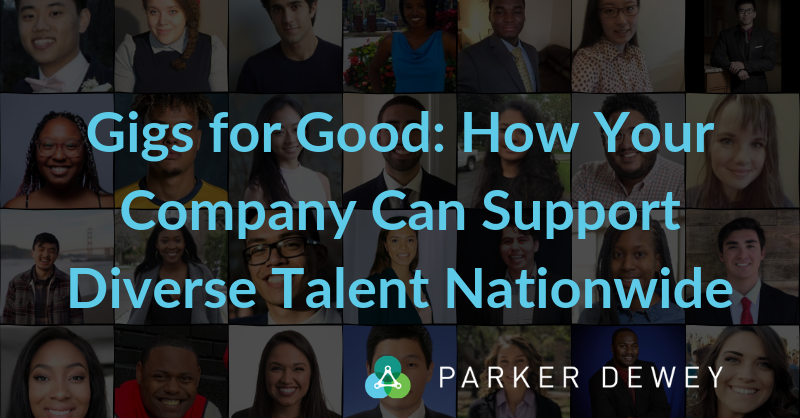
How Companies Can Avoid A Homogenous Workforce
Throughout the entirety of Black History Month, I was so inspired to see so many organizations addressing their diversity, equity, and inclusion challenges.
However, as we move forward, it is vital to keep these positive changes consistent - appreciation for diversity and a focus on increasing equity should not just occur in February. Companies need to continue striving to achieve their DEI goals, especially since despite greater focus on DEI in 2020, Black and Hispanic early career professionals remain 50-70% more likely to be unemployed relative to their white counterparts.
After engaging with millions of college students, recent grads, professionals, and others, we realized that the root of this problem comes down to two things: (1) candidates cannot visualize themselves at a company and (2) hiring managers cannot visualize a candidate at a company. It is a good thing that these are fixable problems!
You can find solutions to this important dilemma in my blog post “Overcoming DEI Challenges in Early-Career Recruiting.”
Jeffrey Moss, Founder and CEO
Articles of the Week
5 Things The Future Of Work Is Not - Forbes
Stepping Up: Hiring for Culture Fit Has Become Controversial — Here's How to Get It Right - Small Giants Community
Why Skills-Based Hiring Starts with Your Job Descriptions - Linkedin Talent Blog
Eight Nonnegotiable Traits You Should Be Looking For In Potential Hires - Forbes
5 Things The Future Of Work Is Not - Forbes
“Although the pandemic accelerated the shift toward a more digital, distributed, and data-driven future of work, employers have the ability to shape the path forward for their employees.”
Since the state of the world during the pandemic is shifting and changing every day, it is nearly impossible to tell what the near-future will hold in terms of work. However, while it is hard to know what the next six months of work will look like, it is possible to predict what the future of work will not be. This article uses the expertise of influential workforce leaders to determine what not to expect as we move forward through 2021.
Related reading: 2021: A Look Forward
Stepping Up: Hiring for Culture Fit Has Become Controversial — Here's How to Get It Right - Small Giants Community
“There’s a real risk of bias when hiring for culture fit, but it’s still important for purpose-driven organizations to put the right people in the right seats.”
On the surface, hiring for culture fit seems like the best course of action: it boosts company camaraderie and employee satisfaction. However, basing hiring decisions on “fit” might lead to discriminating against candidates from a different background and hiring candidates that are socially alike to you, but whose skills don’t align with those necessary to thrive in the job.
Related reading: The Future of Campus Recruiting
Why Skills-Based Hiring Starts with Your Job Descriptions - Linkedin Talent Blog
“[W]hen you need to hire someone, you care about what they can do — not where they’ve been. It’s about weighing a candidate’s competencies over their credentials.”
Hiring based solely upon pedigree leads to a very homogenous workforce. In order to increase diversity in your company, you should be hiring based on skill, performance, and results. The first step in skills-based hiring is listing responsibilities in the job description instead of requirements. In later steps of the hiring process, skills can be assessed through methods such as job auditions or Micro-Internships.
Related reading: Improving hiring effectiveness with "the ultimate job audition"
Eight Nonnegotiable Traits You Should Be Looking For In Potential Hires - Forbes
“[P]utting together a well-functioning team isn’t always straightforward. For an entrepreneur who needs to have team members they can count on, a few personality traits stand out as necessary.”
In this article, eight entrepreneurs provide the most important attributes they look for in hiring new talent. These skills are necessary for the ability to complete good work for any company but are often difficult to assess from resumes or interviews.
Related reading: Stop Guessing at What Employers Are Looking For
For more stories and insights on HR, diversity and inclusion, and hiring, click here to subscribe to our weekly newsletter Hire Learnings




